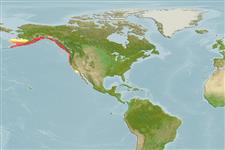Environment: milieu / climate zone / depth range / distribution range
ນິເວດວິທະຍາ
ສັດທະເລ ອາໄສຢູ່ໃກ້ໜ້າດິນໃຕ້ພື້ນທ້ອງນ້ຳ; oceano-estuarine (Ref. 51243); ລະດັບຄວາມເລິກ 0 - 475 m (Ref. 6793). Temperate; 61°N - 31°N, 172°W - 116°W
Northeast Pacific: Shumagin Islands in the western Gulf of Alaska to Ensenada, Baja California, Mexico. Possibly occurring in the Bering Sea (Ref. 6793).
Length at first maturity / ຂະໜາດ / ນ້ຳໜັກ / Age
Maturity: Lm 70.5, range 61 - 76 cm
Max length : 152 cm TL ຕົວຜູ້/ບໍ່ມີເພດ; (Ref. 2850); ນ້ຳໜັກສູງສຸດທີ່ເຄຍຈັດພີມມາ: 59.1 kg (Ref. 40637); ອາຍຸສູງສຸດທີ່ເຄຍລາຍງານມາ: 25 ປີ (Ref. 55701)
ຄີ (ໜາມ)ແຂງຢູ່ຫຼັງປາ (ທັງໝົດ) : 24 - 27; ຄີຫຼັງຂອງປາ (ຄີອ່ອນ) (ທັງໝົດ) : 21 - 24; ຄີ(ໜາມ) ແຂງຢູ່ຄີກົ້ນປາ
ກຸ່ມປາກະດູກແຂງ
ຄວາມຖີ່ຂອງກຸ່ມຖ່າຍທອດພັນ
ປາທີ່ມີການເຄື່ອນຍ້າຍຈາກທະເລໄປຫານ້ຳຈືດ ແລະນ້ຳຈືດຫາທະເລ
ປາທີ່ມີການເຄື່ອນຍ້າຍຈາກທະເລແລະໄປໄຂ່ຢູ່ນ້ຳຈືດ
ຄີກົ້ນຂອງປາ
ສັດທີ່ມີກະດູກສັນຫັຼງ
ການຖ່າຍທອດທາງກຳມະພັນຈາກພໍ່ແມ່ຫາລູກ: 3; ຄີກົ້ນຂອງປາ: 21 - 24; ສັດທີ່ມີກະດູກສັນຫຼັງ: 55 - 59. Anal spines of adults buried in flesh, third spine closely applied to first ray (Ref. 6885). Head without scales; fleshy cirrus above each eye; large mouth; maxilla reaching almost to vertical from posterior margin of eye. Jaws with small pointed teeth interspersed with large fanglike teeth (Ref. 48751).
Ranges from the intertidal to 475 m depth (Ref. 6793). Adults are found near rocks, inshore and to 427 m (Ref. 2850). Young occur on sand or mud bottom of bays and inshore areas (Ref. 2850). Both migratory and non-migratory populations exist (Ref. 6885). Adults feed mostly on other fishes but also take crustaceans, octopi and squid (Ref. 4925). Young feed on copepods and other small crustaceans (Ref. 6885). A very important sport and commercial species (Ref. 2850). The liver is rich in vitamin A (Ref. 6885). Marketed fresh and frozen; eaten steamed, fried, broiled, boiled, microwaved and baked (Ref. 9988). Has sharp teeth and gill rakers that can cut fingers if handled.
Eggs are deposited in crevices or under rocks (Ref. 6885). Male guards the eggs until they hatch.
Eschmeyer, W.N., E.S. Herald and H. Hammann, 1983. A field guide to Pacific coast fishes of North America. Boston (MA, USA): Houghton Mifflin Company. xii+336 p. (Ref. 2850)
IUCN Red List Status (Ref. 130435)
Threat to humans
Traumatogenic (Ref. 13513)
Human uses
ການປະມົງ: ເປັນສີນຄ້າ; ຊະນິດປາທີ່ຖືກນຳໃຊ້ເຂົ້າໃນການຫາເພື່ອເປັນເກມກິລາ: ແມ່ນ
ເຄື່ອງມື
Special reports
Download XML
ແຫຼ່ງອີນເຕີເນັດ
Estimates based on models
Preferred temperature (Ref.
123201): 4.5 - 8.6, mean 5.9 °C (based on 184 cells).
Phylogenetic diversity index (Ref.
82804): PD
50 = 1.0002 [Uniqueness, from 0.5 = low to 2.0 = high].
Bayesian length-weight: a=0.00389 (0.00180 - 0.00842), b=3.12 (2.94 - 3.30), in cm total length, based on all LWR estimates for this body shape (Ref.
93245).
ຊັ້ນເຂດຮ້ອນ (Ref.
69278): 4.5 ±0.6 se; based on diet studies.
ຄວາມຢືດຢຸ່ນ (Ref.
120179): ຂະໜາດກາງ, ປະຊາກອນຕຳ່ສຸດທີ່ໃຊ້ເວລາສອງເທົ່າ 1.4 - 4.4 ປີ (tm=4; tmax=25;).
Prior r = 0.36, 95% CL = 0.24 - 0.53, Based on 2 full stock assessments.
Fishing Vulnerability (Ref.
59153): High vulnerability (56 of 100).
Climate Vulnerability (Ref.
125649): Moderate to high vulnerability (48 of 100).
Nutrients (Ref.
124155): Calcium = 25.5 [9.8, 54.9] mg/100g; Iron = 0.351 [0.157, 0.792] mg/100g; Protein = 18.3 [16.1, 20.3] %; Omega3 = 0.589 [0.263, 1.706] g/100g; Selenium = 28.4 [14.8, 68.4] μg/100g; VitaminA = 9.37 [2.88, 31.89] μg/100g; Zinc = 0.289 [0.192, 0.446] mg/100g (wet weight); based on
nutrient studies.
